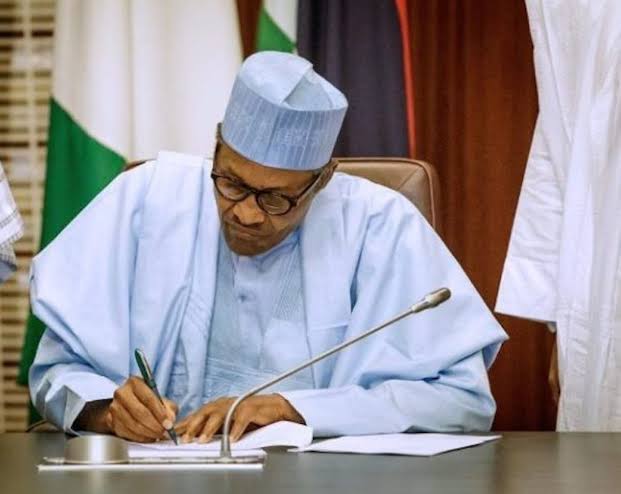A parting presidential signature
By Femi Olugbile
A few days ago, President Muhammad Buhari signed into law sixteen bills amending the existing Constitution of the Federal Republic of Nigeria. These sixteen were selected by him out of a total of 35 Constitution Amendment bills that were forwarded for his assent by the National Assembly, after they had been considered and approved by 27 State Houses of Assembly across the nation. Two contentious bills did not make the list of 35. These were the ones that sought to give financial and legislative autonomy to the 774 local governments in the nation.
Only a few weeks to the end of his tenure, the President clearly has an eye on his place in history. What he has done is to sign off on a raft of ideas that could logically have been part of the ‘Greater Nigeria’ change that his party was supposed to bring to the table in seeking the Presidency for him ab initio. Since getting into office, he has shown no proclivity for meaningful change, and has been known to denounce previous efforts at seeking national consensus through grassroots dialogue, for example remarking that the report of the Constitutional Conference convened by his predecessor was only fit for the dustbin. He has instead been preoccupied with a shaky anti-corruption war, an ‘infrastructure’ crusade that is neither here nor there, and a search for old cattle grazing routes, among other weighty matters. To say the man has had a fraught tenure is to understate the lived experience of Nigerians over the past seven years.
But suddenly the door is opening a crack. Like the recommendations of President Jonathan’s Constitutional Conference, implementation will probably be left to the mercies of his successor. Knowing the antecedents of that elected successor, warts and all, the change will not go into the dustbin, but rather into overdrive. Perhaps the wily old man from Daura is trying to second-guess the future and claim a part of it.
Among the changes are the provision of financial independence for States’ Judiciaries and their Houses of Assembly. These are fundamental, since it is generally known that those much abused, much derided bodies cannot function with latitude and true independence from the executive if they remain financially beholden to it. Some State governors are like emperors, and their untrammelled power and absolute impunity were all too evident in the recent election cycle.
But the real promise of change unleashed by the President is the removal of the railways, the prisons, and electricity from the ‘Exclusive list’ that is the purview, and the crux, of ‘federal’ power, to the ‘Concurrent list’, where states, or presumably any other configuration of ‘federating entities’, may have a say, and make a difference, based on the needs, capabilities and ambitions of their people.
Advocates of Restructuring as a sine qua non for a thriving, truly federal and progressive Nigeria are not exactly rolling out the drums in celebration. But even they recognise that this is a throttle on the neck of a potentially great and dynamic nation that may just have been loosened, at the stroke of a pen.
The devil is in the detail, as the cliché goes.
The psychology behind the action may also not be as obvious as it may seem at first sight. Why now, is a legitimate question to be asked of a leader who heretofore had shown no interest in anything that might diminish ‘federal’ power, and who had always talked down any possibility of change in the manner Nigeria organises and administers its perennially shaky and forcibly sustained union?
Determined advocates of Restructuring speak of throwing out the 1999 Constitution in its entirety, and either reverting to the 1963 Constitution or creating a bespoke Constitution from the consensus of the federating peoples, though a doable legal means of executing this does not immediately present itself. In some quarters, there is palpable worry that the Restructuring battle cry is a smokescreen to disempower those regarded, or those who regard themselves, as the ‘owners’ of Nigeria. The Restructuring camp want a stripping down of most of the powers of the federal government as defined by the ‘Exclusive List’, and a beefing up of the ‘Concurrent List’ where power is shared between the federal and state governments. There will be a ‘Residual list’ where any powers not stated on the two lists become the exclusive preserve of the state or region.
Buhari’s foot-in-the-doorway restructuring gesture would immediately challenge Lagos to meet and jump ahead of the power needs of its burgeoning population, commerce, and industry, ‘by any means necessary’. It would challenge Borno to harness the sun not only to service its people, but to sell the surplus power back to the national grid and make a profit for development, should they be motivated by such ambition. DAWN, the body created by the South-West to harness its development agenda, is already throbbing with excitement about a system of interlinked ‘local’ railway lines that would criss-cross the region and do wonders for farmers, commerce, and general populace.
But these are faint glimpses. Restructuring is not here yet, by any means. The governance structure is still unwieldy, and atrociously expensive. Thirty-six states, most of which are not financially viable suis generis, remain a prescription for an all-powerful centre, doling out handouts to jostling, subservient lackeys. Even the original nice-sounding proposal to fund local governments ‘directly’, which was mercifully killed off, would have created 774 bureaucracies with begging bowls reaching out to Abuja every month for sustenance. All development, to lapse once again into cliché, is local.
It is good to believe Nigeria can be reinvented. Whatever might have been the intentions of the President in signing the recent bills, he deserves kudos this once. The ultimate effect – whether intended or unintended, may yet be the opening of a pandora’s box that will lead Nigeria inexorably to begin to seek, and to find, its hidden self.

